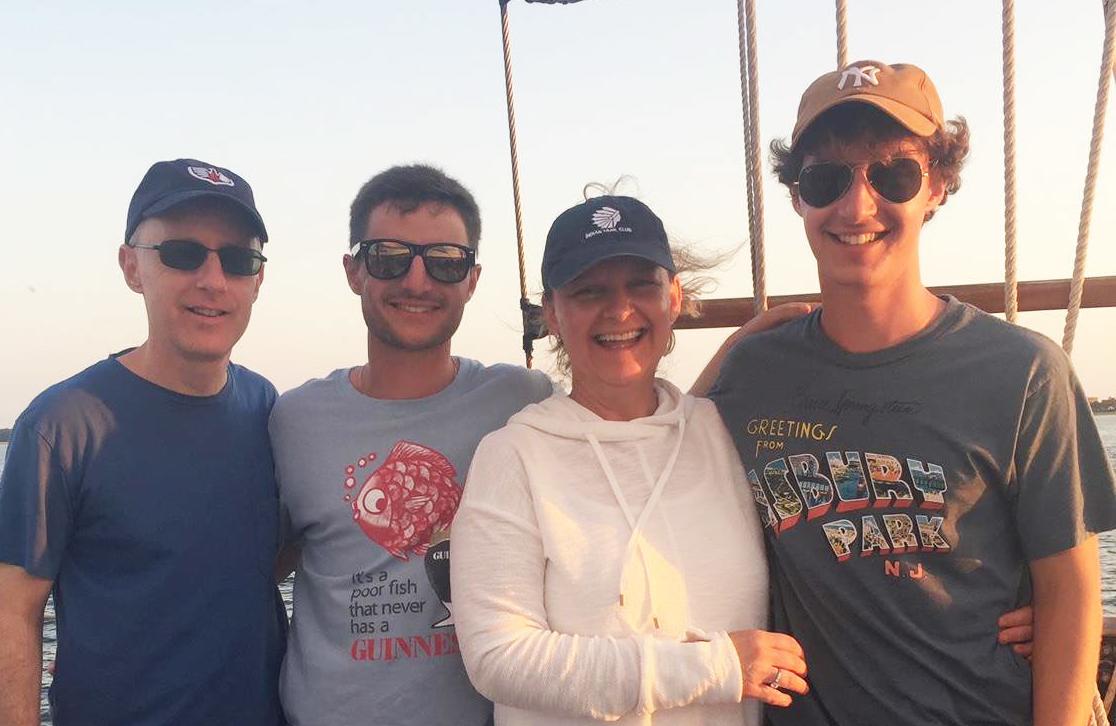In this column originally published March 29 in the Greensboro News & Record, Kieran Ungemach '22 writes about the challenges facing his family as his brother recovers from COVID-19.
Kieran Ungemach ’22 is from Wayne, New Jersey, and is a double major in Journalism and International Global Studies. He is a reporter for Elon News Network and a member of the Elon University men’s cross country team.
Normally, a text from your mother saying that your brother has a 103-degree fever isn’t all that alarming. That’s what Tylenol is for.
But in the era of coronavirus, that kind of news can fill you with fear and uncertainty.
From my dorm room at Elon University, I waited for updates as my 25-year-old brother Brendan’s situation in New Jersey worsened. His fever barely went down, even on Tylenol. His breathing became labored, and his cough turned aggressive.

I was at school hundreds of miles away, while my parents paused their jobs and personal lives by quarantining themselves as soon as he developed symptoms.
They were left to wonder if their two sons would be OK and whether they would develop symptoms of a virus that has crippled medical infrastructures around the globe.
Unable to return to my home due to the threat of getting sick from my family, I soon learned that my brother had indeed tested positive for COVID-19, and that he was one of the more than half a million people around the world unsure about their future in this pandemic.
‘If I can get it…’
“I didn’t think that this was remotely possible,” Brendan said over the phone. He has an apartment in Jersey City and occasionally visits his girlfriend in Manhattan.
“I work remotely from home, and when I’m in the city, I wear clothes I take off right when I get home, and use wipes to wipe down my apartment. It just didn’t make sense to me.
“If I can get it, I’m confident everyone in America can too.”
Four days after he tested positive, I assembled a virtual family meeting with him and my parents on March 24. This was our first time taking stock of the personal hell we had been through since they quarantined themselves in our Wayne, N.J., home for over two weeks.
“It got real very quickly,” Mom said. She hasn’t been able to return to her job in the kitchen at the Indian Trail Club in Franklin Lakes, N.J., after being exposed to my brother. “He never gets sick, so the fact that he woke up with a fever was unusual.”
She described the moment that Brendan, a healthy and active runner, walked into her room on March 11, complaining of a high fever. At that point, New Jersey had 23 positive tests, one confirmed death.
“I immediately jumped to conclusions,” she said. “We all looked at each other and agreed that we had to quarantine and shouldn’t go to work.”
On that same day, I received an email that Elon University would switch to online classes until April 6. That has now been pushed back to Apr. 20.
As I sat in my room, I wondered when I would see my family again, and if our lives would be the same when I eventually did.
“Of course, we wanted you here,” Dad said. “But at the same time, we wanted you to stay healthy.”
‘We are on our own.’
Brendan was eventually able to receive a coronavirus test, after previous tests ruled out the flu and pneumonia. By then, the worst of coronavirus had hit him.
“We got the test on March 16, but results didn’t come until March 20,” Brendan said. He had maintained a temperature above 100 and developed a cough that made it difficult to breathe, along with fatigue. “By the time I got the positive results, the information was useless.”
The most frightening part for us was what we, the doctors, hospitals, the press and the government didn’t know about coronavirus throughout this entire process. The lack of information early on and floods of conflicting information were jarring.
“The only way for me to get a test in those early days, according to the CDC and my doctor, was to go to the hospital. But every article I read told me to avoid hospitals,” Brendan said.
“I was lucky enough to get a test at the doctor’s office, but I had to independently choose to not go to the hospital for fear I would give it to more people if I had it, or get it from someone if I didn’t have it.”
Mom had a similar frustration. “We asked the doctor what to do after his positive result, and she literally said, ‘I don’t know,’ and told us to call the coronavirus hospital hotline,” she said.
The hospital hotline “told us to call our doctor,” Dad said. “Your mother looked at me and said, ‘We are on our own. The people who are supposed to know just don’t know.’”
Full recovery
Fortunately, Brendan has made a full recovery after enduring symptoms for 11 days. Although my parents have not been tested, they haven’t shown symptoms for the coronavirus, which according to the CDC appear two to 14 days after being exposed.
As of March 25, they have all been advised that they’re now free to leave our home, after more than 15 days inside. This means I could theoretically return. But with the inconsistency of information in the past, my path forward is hazy.
New Jersey is the state with the second highest number of positive cases behind New York.
Picture your town hit by a blizzard that drops two feet of snow everywhere, and the power goes out. Snowplows soon clear the roads and the utility companies restore power. Life for some is almost back to normal.
But your road is the only one the plows don’t get to. Your house is the only house without electricity. You are trapped, stuck in place, hopeless and without information about when the snowplows will free you and when the utility workers will light up the darkness.
I’m sure every family touched by this pandemic, feels that helpless and alone.
But we’re not really alone. We are all navigating these dark and ominous times together, waiting for the plows to clear our streets, and for the lights to come back on.



